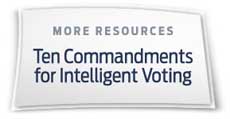
Posted October 5, 2012
Many Seventh-day Adventists, including those living in the United States, have the opportunity to shape their government by exercising their right as citizens to vote. To that end, the Adventist Review publishes occasional articles that focus on Biblical principles that should guide believers as they consider their participation in the electoral process. Neither the Adventist Review nor the Seventh-day Adventist Church endorses political candidates or political parties, urging that each person should consider how to best respond to the opportunities and responsibilities of being a citizen in a democracy.--Editors
The Bible has surprising views about many things. Political involvement, such as voting, is no exception. Here are some insights about how we can be involved in the political process of voting. Voting for what candidates stand for, and not merely their party affiliation or which ones have the best smile, is challenging. Here are some tips for making an educated decision.
Evaluate the Candidates and the Issues
Political candidates always represent a mixture of various moral standards; it is rare to find a candidate who rates well on everything. Some candidates and issues will be choices between bad and worse, but issues that are downright evil should be addressed. Here are some major issues and questions to ask in the voting process:
 1. Life: The first moral priority is human life. God is the creator of life, and all human life is made in His image; so all human life has inherent worth (Gen. 1:26, 27), which is why God prohibits murder. The Bible is also clear that human life begins in the womb. God formed us in our mothers’ wombs (Ps. 139:13). God knew and consecrated Jeremiah while he was in his mother’s womb (Jer. 1:5, 6). John the Baptist recognized the presence of Jesus and leaped for joy while both were still in their mothers’ wombs (Luke 1:41-44). Life is one of the most precious gifts God has given us. Our voting should reflect that.
1. Life: The first moral priority is human life. God is the creator of life, and all human life is made in His image; so all human life has inherent worth (Gen. 1:26, 27), which is why God prohibits murder. The Bible is also clear that human life begins in the womb. God formed us in our mothers’ wombs (Ps. 139:13). God knew and consecrated Jeremiah while he was in his mother’s womb (Jer. 1:5, 6). John the Baptist recognized the presence of Jesus and leaped for joy while both were still in their mothers’ wombs (Luke 1:41-44). Life is one of the most precious gifts God has given us. Our voting should reflect that.
Consider: What value do candidates put on human life? What protections do they advocate to protect it? Is the candidate pro-life, indifferent, or pro-abortion? What is the candidate’s stand on capital punishment?
2. Protection: Protection encompasses both internal and external threats. A police force and local militia protect against domestic threats, while armed forces protect against foreign threats. While evil people use armed forces for evil purposes, that very fact proves the necessity of having armed forces to protect against those who would do us evil. The founders of the United States understood this, and the U.S. Constitution enumerated the need of an army, navy, and militia to suppress insurrections and repel invasions (Article 1, Section 8), and the role of the president as commander in chief (Article 2, Section 2).
Consider: Does the candidate understand the protective role of government, both locally and nationally, and advocate law and order? Police should be supported in their protective role and restricted from becoming oppressive. Does the candidate understand the necessity and proper use of force as well as diplomacy in averting war (Prov. 20:18; Luke 14:31)? We should always avoid war when possible, but there must be the ability to wage it with clear purpose and objectives when necessary.
3. Justice: Government has the responsibility to establish and execute justice (the degree a government deviates from God’s standards of justice is the degree to which it fails). Governments often fall into the pattern of injustice because of human nature. Justice must be carried out with the right attitude. As the prophet said, “He has shown you, O mortal, what is good. And what does the Lord require of you? To act justly and to love mercy, and to walk humbly with your God” (Micah 6:8). This statement encompasses what we do, what we desire, and who we are. Humility in walking with God brings about the kindness and mercy that temper justice. We are to be merciful because we have received mercy from God (Matt. 5:7; 18:21-35). However, mercy without justice is injustice and an abandonment of the protective role of government.
Consider: Do candidates uphold the rule of law? Do they advocate the interpretation of the law according to its original intent? Do they advocate laws based on biblical standards, or something else? Are candidates fair in their dealings with both supporters and opponents? Is the candidate subject to political corruption by influences either in or outside government?
4. Morality: The Old Testament prophet Isaiah pronounces, “Woe to those who call evil good and good evil, who put darkness for light and light for darkness” (Isa. 5:20). Many in our societies do just that. In the Bible God clearly describes what is good and what is evil. He also pronounces some things as abhorrent and abominations. Some things are especially evil and should receive a priority in a government’s protective efforts and the application of justice. Some of these things reveal an evil character even when the outward presentation looks good. The Old Testament word for abomination (toebah) is usually used to refer to idolatry and the improper worship of God. However, some societal actions are also described as abominations (Lev. 18).
Consider: Do candidates seek to protect institutions such as marriage? What actions support the family?
 5. Economic Fairness: The Bible makes frequent appeals to help the poor and care for the needy. The role of the government is to help those who can’t help themselves. The church has the same calling. The distribution of wealth can have a tendency to make people lazy and reliant, so watch for balance (Lev. 25; Ruth 2; Matt. 25:41-46).
5. Economic Fairness: The Bible makes frequent appeals to help the poor and care for the needy. The role of the government is to help those who can’t help themselves. The church has the same calling. The distribution of wealth can have a tendency to make people lazy and reliant, so watch for balance (Lev. 25; Ruth 2; Matt. 25:41-46).
Consider: Do candidates desire to help the needy? Or do they support initiatives that tend to make people dependent on government?
6. Personal Integrity. The words of the wise man are helpful in understanding God’s assessment of people, and therefore helpful in evaluating a political candidate’s personal integrity: “There are six things the Lord hates, seven that are detestable to Him: haughty eyes, a lying tongue, hands that shed innocent blood, a heart that devises wicked schemes, feet that are quick to rush into evil, a false witness who pours out lies, and a person who stirs up strife in the community” (Prov. 6:16-19).
Haughty eyes refer to that condescending look the proud can give because they think themselves to be superior to the rest of us. This is a common attitude among the political elite. Is the candidate proud or humble?
A lying tongue represents a dishonest and selfish character. Some politicians have turned lying into an art form. But the Bible strongly warns against lying. All candidates fail at some point, but more is revealed about their integrity by whether they are honest about their failure, not in the failure itself. Watch how candidates work with others, and how they handle opposing views and people.
Consider: Do the candidates’ vision for the future and goals for the present line up with what God wants? Do they promote what is moral and godly and strive to restrict what is evil, or do they call good evil and evil good?
It’s Your Turn
Our voting should be guided by biblical values and priorities instead of political ones. Moral character and personal integrity are more important than any set of proclaimed policies and promises. We will never find a candidate with whom we can agree 100 percent on every issue, but we are to evaluate carefully and vote the best we can.
As Christians, our first priority is to please God and trust Him to bring good out of any situation, even when the results are not to our liking and seem to be antagonistic to His stated moral will. Our primary goal is to please the Lord, not to be on the winning side; to one day stand before our Lord and hear Him say, “Well done, good and faithful servant” (Matt. 25:21).
________________________
S. Joseph Kidder, professor of Christian Ministry, Seventh-day Adventist Theological Seminary at Andrews Univeristy, Berrien Springs, Michigan .